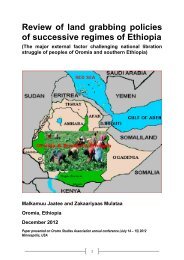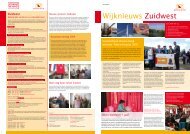freakonomics
freakonomics
freakonomics
Create successful ePaper yourself
Turn your PDF publications into a flip-book with our unique Google optimized e-Paper software.
per year—which sounds like a lot of money, unless you care to measure it against<br />
something seemingly less important than democratic elections.<br />
It is the same amount, for instance, that Americans spend every year on chewing gum.<br />
This isn’t a book about the cost of chewing gum versus campaign spending per se, or<br />
about disingenuous real-estate agents, or the impact of legalized abortion on crime. It will<br />
certainly address these scenarios and dozens more, from the art of parenting to the<br />
mechanics of cheating, from the inner workings of the Ku Klux Klan to racial<br />
discrimination on The Weakest Link. What this book is about is stripping a layer or two<br />
from the surface of modern life and seeing what is happening underneath. We will ask a<br />
lot of questions, some frivolous and some about life-and-death issues. The answers may<br />
often seem odd but, after the fact, also rather obvious. We will seek out these answers in<br />
the data—whether those data come in the form of schoolchildren’s test scores or New<br />
York City’s crime statistics or a crack dealer’s financial records. (Often we will take<br />
advantage of patterns in the data that were incidentally left behind, like an airplane’s<br />
sharp contrail in a high sky.) It is well and good to opine or theorize about a subject, as<br />
humankind is wont to do, but when moral posturing is replaced by an honest assessment<br />
of the data, the result is often a new, surprising insight.<br />
Morality, it could be argued, represents the way that people would like the world to<br />
work—whereas economics represents how it actually does work. Economics is above all<br />
a science of measurement. It comprises an extraordinarily powerful and flexible set of<br />
tools that can reliably assess a thicket of information to determine the effect of any one<br />
factor, or even the whole effect. That’s what “the economy” is, after all: a thicket of<br />
information about jobs and real estate and banking and investment. But the tools of<br />
economics can be just as easily applied to subjects that are more—well, more interesting.<br />
This book, then, has been written from a very specific worldview, based on a few<br />
fundamental ideas:<br />
Incentives are the cornerstone of modern life. And understanding them—or, often,<br />
ferreting them out—is the key to solving just about any riddle, from violent crime to<br />
sports cheating to online dating.<br />
The conventional wisdom is often wrong. Crime didn’t keep soaring in the 1990s, money<br />
alone doesn’t win elections, and—surprise—drinking eight glasses of water a day has<br />
never actually been shown to do a thing for your health. Conventional wisdom is often<br />
shoddily formed and devilishly difficult to see through, but it can be done.<br />
Dramatic effects often have distant, even subtle, causes. The answer to a given riddle is<br />
not always right in front of you. Norma McCorvey had a far greater impact on crime than<br />
did the combined forces of gun control, a strong economy, and innovative police









